|
|
|
Sort Order |
|
|
|
Items / Page
|
|
|
|
|
|
|
| Srl | Item |
| 1 |
ID:
079933
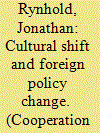

|
|
|
|
|
| Publication |
2007.
|
| Summary/Abstract |
This article analyses the role of cultural shift, as defined by Inglehart, in the major change in Israeli foreign policy embodied in the Oslo Accords. Aside from providing an empirical explanation, it also analyses the Oslo case from a general theoretical perspective concerning the relationship between cultural change and foreign policy change. It argues that a cultural shift towards Postmaterialism led to the rise of a new generation on the Israeli Left with a more Liberal outlook. It was this `Liberal Left' that was primarily responsible for conceiving, initiating and enacting the Oslo Accords. In broader terms, this study provides a new way of examining the relationship between cultural change and foreign policy change. As such, it provides a solid basis for the comparative analysis of the role of a substantive, worldwide cultural trend on foreign policy.
|
|
|
|
|
|
|
|
|
|
|
|
|
|
|
|
| 2 |
ID:
177514
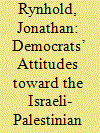

|
|
|
|
|
| Summary/Abstract |
Since 2015, there has been a sharp turnaround in US Democrats’ sympathies for Israel and the Palestinians. The percentage of Democrats with a preference for Israel is more or less tied with those preferring the Palestinians, wiping out Israel's historic advantage. Long-term processes of liberalization and secularization have generated a more difficult environment for Israel and a more favorable one for the Palestinians, but they alone do not account for the shift. Rather, the fusing of these trends with changes in Israel triggered the change. The formation of a narrow right-wing government in 2015 played a significant role. However, the primary cause of the collapse in sympathy for Israel was the way in which Prime Minister Benjamin Netanyahu's Republican-first strategy to block the Iran nuclear deal turned Israel into a highly salient motif of partisanship at a time of unparalleled hostility between the two major US parties. While the fall in sympathy for Israel spans both wings of the Democratic Party, the sharp increase in sympathy for the Palestinians has occurred primarily among liberal Democrats. It is intertwined with the growing political salience of Black Lives Matter, which helps to generate a narrative associating racial discrimination in America with the plight of the Palestinians.
|
|
|
|
|
|
|
|
|
|
|
|
|
|
|
|
| 3 |
ID:
056724
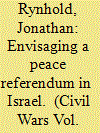

|
|
|
| 4 |
ID:
160913
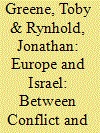

|
|
|
|
|
| Summary/Abstract |
Frustration over right-wing Israeli policies on Palestine has held back the advance of EU–Israel relations, but has not yet led to EU-wide pressure.
|
|
|
|
|
|
|
|
|
|
|
|
|
|
|
|
| 5 |
ID:
078590
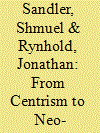

|
|
|
| 6 |
ID:
181191
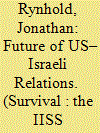

|
|
|
|
|
| Summary/Abstract |
The special relationship between the United States and Israel has been built on three pillars: shared strategic interests, the resonance of Israel in American political culture and the influence of the pro-Israel lobby. While the strategic pillar has been the most controversial, as many in Washington have viewed Israel as a strategic liability, the dramatic improvement in relations between Israel and America’s Gulf Arab partners has diminished this concern. But the once strong cultural and domestic political pillars are now under strain. In the wake of a sharp decline in sympathy for Israel within the Democratic Party, bipartisan support for Israel is now in doubt. The new Israeli government has the potential to arrest and reverse this decline. Without progress towards a two-state solution to the Israeli–Palestinian conflict, however, the challenge will remain.
|
|
|
|
|
|
|
|
|
|
|
|
|
|
|
|
| 7 |
ID:
101744
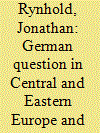

|
|
|
|
|
| Publication |
2011.
|
| Summary/Abstract |
Within the field of International Relations, theoretically informed explanations of the long peace in Europe since 1945 tend to focus on Western Europe, especially the revolution in Franco-German relations. In contrast, German relations with Central and Eastern Europe (CEE) are ignored, despite the fact that this nexus was a major cause of instability prior to 1945. This article focuses on why the German question in CEE ceased to threaten the stability of Europe after 1945. The article empirically examines the development of the German question in CEE since 1945, which refers here mainly to the Oder-Neisse line and the plight of ethnic Germans expelled from CEE after World War II. It provides a theoretically integrated and chronologically sequenced explanation. First, it argues that Realism primarily explains the successful containment of the German question in CEE between 1945 and the late 1960s. Second, it argues that the Constructivist process of cultural change, which altered German intensions, was primarily responsible for subsequently increasing the depth of peace and stability between Germany and CEE, especially after the Cold War. Finally, it is argued that prior Realist factors and Liberal processes constituted a necessary, though not sufficient, condition for cultural change.
|
|
|
|
|
|
|
|
|
|
|
|
|
|
|
|
| 8 |
ID:
082072
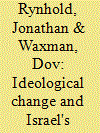

|
|
|
|
|
| Publication |
2008.
|
| Summary/Abstract |
Jonathan Rynhold and Dov Waxman posit that ideological change within the right-wing Likud party generated support for the partition of Israel that was a vital prerequisite to the Sharon government's adoption of the Gaza disengagement plan in 2005. Although international and domestic pressures were important in determining certain elements of the withdrawal, they did not dictate the policy of disengagement.
|
|
|
|
|
|
|
|
|
|
|
|
|
|
|
|
| 9 |
ID:
059075


|
|
|
| 10 |
ID:
051416
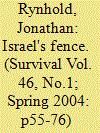

|
|
|
|
|
| Publication |
2004.
|
| Description |
p55-76
|
| Summary/Abstract |
Israel's security barrier is under construction and it is likely to be finished, so arguments about whether it should be built at all are pretty much academic. Far more important now is the nature and route of the barrier. Routes that go too deep into West Bank territory, that cut off and isolate Palestinian villages and encompass remote Israeli settlements are indeed likely to heighten the Palestinians' humiliation, harm them economically, and provoke worsened violence and terrorism. But other routes, closer to the ‘Green Line’, could exert more positive influence, not least because they would logically entail the abandonment of unviable settlements. A sensibly routed barrier has the potential not only to help protect Israelis from terrorists, but also to make a broader strategic contribution as a mechanism for managing the conflict and as a back-up plan as the prospects for a formal agreement fade.
|
|
|
|
|
|
|
|
|
|
|
|
|
|
|
|
| 11 |
ID:
078597
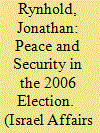

|
|
|
| 12 |
ID:
059073
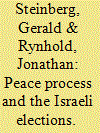

|
|
|
| 13 |
ID:
062096
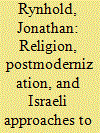

|
|
|
|
|
| Publication |
Spring/Summer 2005.
|
| Description |
p371-389
|
|
|
|
|
|
|
|
|
|
|
|
|
|
|
|
| 14 |
ID:
175463
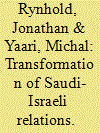

|
|
|
|
|
| Summary/Abstract |
This article analyzes the transformation of a new and important relationship between Israel and Saudi Arabia, bringing to light hidden aspects of their relations. It analyses the causes and character of this shift, as well as the opportunities, constrains and challenges for the relationship going forward. The primary cause of the transformation is the greatly increased threat posed by Iran and a shared concern about the reliability of the United States as an ally in this regard. The rise of the Iranian threat has weakened the influence of the Palestinian issue over Saudi policy to Israel. In the 2010s Israel and Saudi Arabia cooperated extensively to contain Iran, despite the absence of peace negotiations. Moreover, in contrast to the past, the Saudi regime is more flexible regarding the terms of any Israeli-Palestinian deal and sanctioned steps towards normalising relations with Israel prior to a comprehensive peace agreement. The future development of the relationship is still constrained by the transnational resonance of the Palestinian issue, but this constraint is weakening.
|
|
|
|
|
|
|
|
|
|
|
|
|
|
|
|
|
|
|
|
|